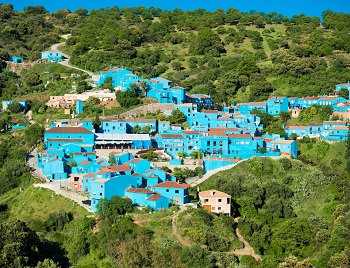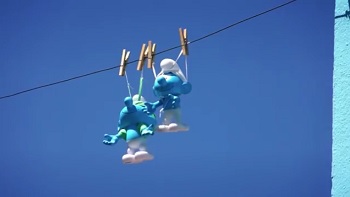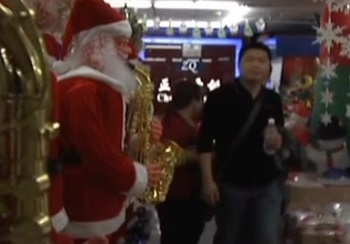5 Real Places Whose Economies Are Based On Insanity

Plenty of towns, cities, and even small nations rely on a single business to keep their economy running. As the main source of steady work and prosperity, such businesses become integral parts of these communities -- which they usually acknowledge by naming their sports team after the products in question. (Go Purple County Rubber Nipplers!)
But not all places can be lucky enough to be the home of a famous line of cars or planes or assault rifles. Sometimes, these tiny titans of industry dedicate themselves to things we didn't even know were big business. And when that's the case, their influence on the local culture can be very ... unpredictable. For example ...
A Small Spanish Village Got Out Poverty By Randomly Becoming The Smurf Capital Of The World
When you're poor, you're willing to do a lot of degrading things for money, like street fighting, or prostitution, or telemarketing. So when some rich guy offers you a sweaty fistful of cash to lower yourself for his pleasure, most people will say yes faster than Nicolas Cage. But sometimes, it's the downtrodden who come out on top of that deal -- like when an impoverished Spanish town turned a dumb publicity stunt into a blue goldmine.

Yes, those are houses, not God's tacky new swimming pool.
In 2011, for an unknown reason that must have involved some long nights and ketamine, the Sony marketing team for the Smurfs movie decided to paint a town completely blue as a viral publicity stunt. They managed to convince Juzcar, a small, struggling village in Spain, to blue itself like a real-life Tobias Funke, covering everything from the houses to the churches to hundred-year-old gravestones in paint. Once the film's promotion ended, Sony offered to repaint everything the way it had been before. But the people of Juzcar knew a cash smurf when it smurfed one, so they decided to keep the town's new color and, more importantly, its Smurf association.

Come for the naked old creep in the bushes, stay for the shirtless asshole glaring at you while you eat.
Not only did the residents vote to keep the town painted blue, but they also went a little Smurf-crazy. Take a walk through its streets, and you'll find many Smurf paintings on buildings and Smurf statues in the parks. Gifts shops have popped up all over selling Smurf key chains and T-shirts. Order food in a cafe, and there is a good chance that your spaghetti will be blue. And if you are as obsessed with fungi as the Smurfs, you can learn all about it in the local mushroom museum. David Fernandez Tirado, the mayor responsible for this makeover, has even been nicknamed "Papa Smurf."

No beard, but we're guessing plenty of Smurfettes.
But why did the town decide to give itself blue fever (besides improving Mayor Papa Smurf's pillow talk)? Like Sony and Gargamel before them, Juzcar realized these Smurfs could make them rich. Considering Spain is in a massive economic slump and unemployment is at an all-time high, lots of the country has to rely on corporate investments and tourism to get by. Painting the town blue wasn't just publicity for The Smurfs movie, but also free publicity for the town itself. For a place that was once so nondescript and off the beaten path that fewer than 300 tourists visited yearly, the mayor now says it isn't uncommon for more than a dozen busloads of people to come in a weekend. Thanks to The Smurfs, Juzcar now prospers. So there's at least one good thing that came out of that godawful movie.

Even those in town might be sick of Smurfs, judging by the most adorable lynching ever.
A Single Town In China Makes 60 Percent Of The World's Christmas Decorations
When Christmas comes along, you might notice that most of your gifts say "Made in China" somewhere on the bottom. That's because, unlike those elves and their guilds, China has the kind of loose labor laws Santa needs to supply the entire world with gifts in one night. But gifts aren't the only part of the holiday cheer that China provides. Flip over those Christmas lights, tree ornaments, and plastic reindeer, and you'll find the same Chinese trademark. That's because most of our Christmas decorations are made in a small town thousands of miles away from the North Pole called Yiwu.

If that shocks you, you have no idea what goes on in actual chocolate factories.
Yiwu and its 600 factories manufacture more than 60 percent of all those yuletide-related tchotchkes we can't get enough of. It's known by its residents and visitors alike as "China's Christmas Village" -- a place where it's always that most wonderful time of the year. Walk down the street, and you'll often see one of the thousands of Christmas factory workers walking home still wearing their Santa hat. Not because they love the holidays or because their bosses thought it would be good for morale, though. Many of the workers wear them because they aren't provided with the necessary protection to shield their heads from the highly invasive and toxic red dust swirling through the factories. Making Christmas happen is hard and unpleasant work, which is why most of the factories are populated by migrant workers, who make very little money and work up to 12 hours a day.

It's the moooooost wonderful tiiiiiiime of the year!
Very few of the laborers celebrate Christmas, and some of them don't even know what it is (one worker guessed it was "Chinese New Year for foreigners"). This might explain why there are some pretty odd decorations found around the town, such as sheep in Santa hats and Saint Nick playing a saxophone.

"Careless Whisper" is their number-one Christmas carol.
After the migrant elves have completed the baubles, they're taken to the Yiwu International Trade Market, also known as China Commodity City, where the pieces of cheap plastic outnumber the people a thousand to one. Here, in this massive year-round trade show, retailers and Christmas fanatics from around the world come to inspect the yuletide products and make deals.

Leave your lights up all year like a jackass? Welcome to your new church.
But like so many other places, Yiwu is losing out to online retailers. While the town makes most of its money through the trade market, which has over 400,000 types of decoration on display, retail sites like Alibaba offer 1.4 million similar Christmas products at the click of a button. Even that annoying neighbor whose house looks like the Christmas spirit got drunk and threw up on the front lawn doesn't need that much Christmas crap. Still, things are looking up for Yiwu, as more and more Chinese people are rejecting communism in favor of capitalistic materialism -- and that path will lead them straight into Santa's lap.

"Merry Christmas, soul-sucking slave labor! Merry Christmas, joyless year-round eyesores! Merry Christmas!"
Swaziland's Entire Economy Is Fueled By Corrupt American Soda
"Coke or Pepsi?" is a question corporations spend millions of dollars trying to get us to answer, even though most of us will gladly accept one when the other isn't available. But in certain parts of Africa, answering which sugary drink you prefer might get you in thrown in prison, because one of them is currently propping up a notorious despot. Here's a hint: It's the real thing.

The real depressing thing.
The tiny African nation of Swaziland, which is also the last absolute monarchy on the continent, is in the pocket of Big Cola -- specifically, Coke. Coca-Cola's African base is located in Swaziland, and their exports of sugar and drink concentrates make up anywhere between 22 and 40 percent of the country's GDP. Those who work in the Coca-Cola plant are some of the richest citizens in the country, which also means they're the only ones who can afford to stock their fridge with real Coke.

Though judging by that royal pudge, the king's Coke doesn't spend much time in the fridge at all.
But with one of the world's highest poverty rates, it isn't the regular people who are rolling in that dough. The taxes Coke pays seem to be going straight to King (and dictator) Mswati III, who uses it to build up his $100 million fortune. And when he's not ordering some human rights abuses, taking the country's money for himself, or picking a new bride (he already has 13) out of thousands of topless virgins, he can be found visiting the Coca-Cola headquarters in Atlanta. Activists are trying to pressure Coca-Cola to move their company, or at least use the money they make to help the pro-democracy movement in the country. But considering they have been known to take out full-page ads in newspapers to wish Mswati happy birthday, we don't see them stopping being BFFs anytime in the near future.

Mswati III: worse than Coke II.
The Town Of Qiaotou Makes Millions Of Buttons A Day
Chances are you have at least one button on your clothes somewhere, unless you are currently reading this naked. Buttons are the unsung heroes of keeping our pants from falling down. Yet how many of us have ever actually met a button maker in casual conversation? Not many, because the majority of the world's button makers live a secluded life in rural China, where one town is responsible for manufacturing three out of every five buttons on the planet.
According to very recent legend, the town of Qiaotou became the world capital of buttons about 30 years ago, when three brothers were walking along a street, saw some buttons in the gutter, and instead of leaving the dirty garbage on the ground like most normal people, picked them up and sold them. Because of those three mythical brothers, Qiaotou now has around 200 factories employing 20,000 people, with one company alone making two to three million buttons a day. With that kind of output, they should cut out the middleman and start using buttons as currency, like some weird post-apocalyptic barter system.

"Attention, citizens: Possession of a zipper is now an executable offense."
However, Qiaotou has become a victim of its own success. Today, if you want to be successful in the button business, you have to be located in this town (like Nashville or Los Angeles, but for buttons). With so many companies in one place, most of your competition is right across the street, forcing them to continually slash prices in order to stay afloat.
And if it sounds like working in a button factory would kind of suck, a lot of the current workers agree with you. Qiaotou was struggling with poverty before the arrival of the button industry, so at first, the offer of any kind of job was welcome. But now that the town is thriving, many villagers are looking beyond their low-paying jobs and looking elsewhere to better use their skills. That means the bosses need to offer extra incentives to stay on top of the cutthroat world of button-making. This can come in the form of food, housing, and even libraries or gyms. Still, despite their labor shortage and competitive pricing, Qiaotou still regards itself as recession-proof. To paraphrase one factory worker, unless we all decide to start letting our underpants groceries whistle in the wind, there will always be a need for buttons.
A Tiny Island Was Economically Ruined By Bird Shit
The microscopic island nation of Nauru is in serious trouble. Global warming might sink it completely under the ocean, bad investments are tanking its economy, and it's on the verge of running out of its only precious resource: bird shit. Unlike most seaside towns, Nauru would love to be absolutely covered in seagull droppings again, because to them, these avian loads are worth their weight in gold.

"One day, son, all this will be yours ..."
As we've previously discussed, guano -- a special kind of calcified poop made only by bats, seabirds, and seals -- is incredibly valuable. After thousands of years of crapping, many Pacific islands were completely covered in fossilized bird doo-doo. Its phosphorus was perfect for manufacturing everything from cheap gunpowder to makeup. After Nauru won its independence in 1968, the trust it built up from the mining of this poop was estimated at up to a billion dollars, and its 9,300 citizens had one of the highest per capita incomes in the world. But like any fossil fuel, the guano is running out -- giving a whole new definition to being shit out of luck.

"Crap FASTER, dammit!"
Part of Nauru's economic downfall is it's own fault. All that valuable poop must have blinded them from acting rationally, because it has been spending its money like a typical trust fund kid. One notable example of outrageous fiscal mismanagement happened when they invested $2 million in a failed musical about Leonardo da Vinci that just so happened to be written by one of their financial advisors.
Their current financial situation isn't helped by the fact that most Nauruans haven't really worked a day in their lives before the meltdown, having outsourced the labor to Asian migrant workers and the management of the guano industry itself to the Australians. They even stopped farming decades ago, eating and drinking nothing but imported canned food and beer.

A rare photo of them exercising.
Now, the once-proud island keeps itself in the black by holding asylum seekers for Australia, hustling Taiwan and China for diplomatic bribes, and even making shady deals with Russia, asking for $50 million in return for recognizing the sovereignty of Abkhazia and South Ossetia, countries Russia created after invading Georgia. To make ends meet, Nauru isn't afraid to get its hands dirty -- which isn't all that surprising for a nation whose previous Solomon-esque economy was derived from literal shit.
Also check out 6 Mental Illnesses That Only Happen In One Place On Earth and 5 Mental Disorders That Only Occur In One Place On Earth.
Subscribe to our YouTube channel, and check out The 6 Most Blatant Lies Companies Based Entire Ads On, and other videos you won't see on the site!
Follow us on Facebook, and please let us hug you.





